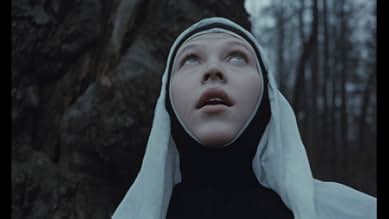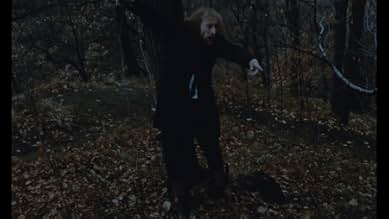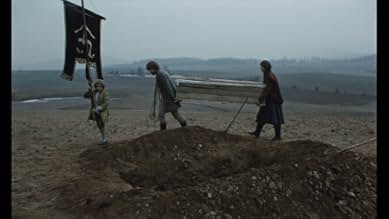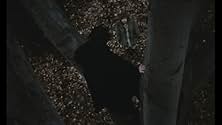NOTE IMDb
7,0/10
3,3 k
MA NOTE
Ajouter une intrigue dans votre langueYoung Polish noble Jakub, freed during 1793 Prussian invasion, experiences father's death, betrayal. Traumatized, he follows his savior, committing brutal murders across the country.Young Polish noble Jakub, freed during 1793 Prussian invasion, experiences father's death, betrayal. Traumatized, he follows his savior, committing brutal murders across the country.Young Polish noble Jakub, freed during 1793 Prussian invasion, experiences father's death, betrayal. Traumatized, he follows his savior, committing brutal murders across the country.
- Réalisation
- Scénario
- Casting principal
Avis à la une
Andrzej Zulawski's 'The Devil' is a real oddity from the early 1970s. Originally released in 1972, but banned at the behest of the Catholic church, it has been little seen, which is a pity, because it is a fascinating movie that deserves a larger audience. Reminiscent at times of Jodorowsky and sometimes Fellini, this is a very puzzling movie steeped in religious symbolism.
In 18th Century Poland the Prussian army are in the process of conquering the country. In the midst of this chaos a mysterious figure arrives at a convent with orders to escort a political prisoner. The prisoner, a young man named Jakub, was accused of attempting to murder the King. The man finds Jakub, and along with a young nun they flee the oncoming troops. Once they are safe Jakub is freed and urged to return home. When he arrives he finds that nothing is as before. His father burnt down the family home before committing suicide, his pregnant fiancee has married one of his friends, and his mother is a whore. Jakub is constantly described by others as being a lunatic or "sick" yet in many ways he appears to be the sanest one of the lot. To complicate matters the man who initially rescued him shadows his every move and seems to have a strange agenda of his own. Is Jakub mad or is the world? Who is the enigmatic stranger and what does he want of Jakub? 'The Devil' will appeal to fans of strange, multi-layered movies.
In 18th Century Poland the Prussian army are in the process of conquering the country. In the midst of this chaos a mysterious figure arrives at a convent with orders to escort a political prisoner. The prisoner, a young man named Jakub, was accused of attempting to murder the King. The man finds Jakub, and along with a young nun they flee the oncoming troops. Once they are safe Jakub is freed and urged to return home. When he arrives he finds that nothing is as before. His father burnt down the family home before committing suicide, his pregnant fiancee has married one of his friends, and his mother is a whore. Jakub is constantly described by others as being a lunatic or "sick" yet in many ways he appears to be the sanest one of the lot. To complicate matters the man who initially rescued him shadows his every move and seems to have a strange agenda of his own. Is Jakub mad or is the world? Who is the enigmatic stranger and what does he want of Jakub? 'The Devil' will appeal to fans of strange, multi-layered movies.
I wouldn't call this horror at least not in the traditional sense. Jakob freed from jail tries to return to his previous life with a aid who has his own agenda. The Devil is in the details indeed as you the viewer are forced to play catch up with a series of events that must be interpreted to understand the craziness and violence this movie portrays.
There is in impatience that plagues every event along with musical scores that tries as it does to build tempo and rhythm to the maniacal. Does it really matter who Jacob was? Butchery to betrayal, the nun and a whole lot of death and suffering all wrapped up in a wacky 70's score. Best not to leave out that almost every character is full of self loathing.
Not sure if I'd watch it twice though, the dialog isn't very captivating and the story isn't really what you are here for. You watch it because someone didn't want you to see something with a powerful political message. Like having your world turned upside down. So you'll watch it like I did, hoping to find something everyone else missed.
There is in impatience that plagues every event along with musical scores that tries as it does to build tempo and rhythm to the maniacal. Does it really matter who Jacob was? Butchery to betrayal, the nun and a whole lot of death and suffering all wrapped up in a wacky 70's score. Best not to leave out that almost every character is full of self loathing.
Not sure if I'd watch it twice though, the dialog isn't very captivating and the story isn't really what you are here for. You watch it because someone didn't want you to see something with a powerful political message. Like having your world turned upside down. So you'll watch it like I did, hoping to find something everyone else missed.
Thick smoke, nuns and screams. Crazy people and blood. Intense lighting and use of colour amidst the chaos. Each frame seems crowded - either through closeup or frenzy; moments of stillness are rare. Who is the stranger who saves Jakub? Why the nun? The madness of his surroundings - acrobats and theatricals, dancers and whores, mirror the insanity of the world. There is no goodness here. Monstrosity is the only answer.
Well, i went into this completely blind. Had no clue this movie existed. I can tell you that this movie is really hard to follow. I wanted to watch this with subs from my country, but sadly i found it only with English subs, so it was really, REALLY hard to follow. But what i followed was pretty good.
This movie never got boring, maybe a tiny bit, but for the most part it's really sharp. I can tell you that the movie has a clear message: A King that's being influenced with God and Evil. The King (who was said to be mentally ill at times, not 100% sure bout that), only followed the Diabel, while the Nun the Good, he just ignored her, and she was there for nothing.
This movie depicts in a very brutal, way how it is to be forgotten. This King has been sentenced to death, and when he escaped, nobody really cared for him: His wife re-married, his mother is a prostitute, his sister barely cared, it's like when you get locked up for such a long time, when people forget about you, they just dont care anymore.
Also, what we forget, is how many people have been killed because of the Diabel, even though these people did not care, the King killed people that nothing to do with being forgotten, like the Turkish woman, and the other actor... He killed people that had nothing to do with this, and then he Diablo forced him into self destruction, untill in the end, when the Devil shows it's true face.
This is an amazing movie, i actually wanted to give it 10/10, but it's just too difficult to follow. I think this movie was inspired based on 1971 The Devils, they seem kinda similar, and i loved 1971 The Devils, this is kinda in the same boat. I think this is the first movie ive seen from Poland, and it's worth watching.
I enjoyed what was served, even though i think i didn't pick up on a lot of what was being said, but still pretty well made movie for what it is. A lot of people are complaining over bad acting, and bad "directing". No, to everything seemed to work pretty well. And as i say 100 times, the MOST important thing when it comes to movies, is the plot, this had a strong plot, and i enjoyed it.
This movie never got boring, maybe a tiny bit, but for the most part it's really sharp. I can tell you that the movie has a clear message: A King that's being influenced with God and Evil. The King (who was said to be mentally ill at times, not 100% sure bout that), only followed the Diabel, while the Nun the Good, he just ignored her, and she was there for nothing.
This movie depicts in a very brutal, way how it is to be forgotten. This King has been sentenced to death, and when he escaped, nobody really cared for him: His wife re-married, his mother is a prostitute, his sister barely cared, it's like when you get locked up for such a long time, when people forget about you, they just dont care anymore.
Also, what we forget, is how many people have been killed because of the Diabel, even though these people did not care, the King killed people that nothing to do with being forgotten, like the Turkish woman, and the other actor... He killed people that had nothing to do with this, and then he Diablo forced him into self destruction, untill in the end, when the Devil shows it's true face.
This is an amazing movie, i actually wanted to give it 10/10, but it's just too difficult to follow. I think this movie was inspired based on 1971 The Devils, they seem kinda similar, and i loved 1971 The Devils, this is kinda in the same boat. I think this is the first movie ive seen from Poland, and it's worth watching.
I enjoyed what was served, even though i think i didn't pick up on a lot of what was being said, but still pretty well made movie for what it is. A lot of people are complaining over bad acting, and bad "directing". No, to everything seemed to work pretty well. And as i say 100 times, the MOST important thing when it comes to movies, is the plot, this had a strong plot, and i enjoyed it.
In Poland, a mysterious man comes to a chaotic convent to bring to Warsaw the nobleman political prisoner Jakub (Leszek Teleszynski) that imprisoned in the dungeons. The stranger requests the list of fellow conspirators to Jakub and abducts a nun to travel with Jakub in his journey back home. When he arrives in his destroyed house, he sees his father dead; his sister abused and insane; his mother in a brothel; and his girlfriend pregnant and living with his former best friend. Jakub becomes deranged and using a razor delivered by the stranger, he kills each sinner, in an irrational period of chaos and moral degradation.
"Diabel" is a messy, pointless and violent journey to insanity. The writer and director Andrzej Zulawski makes a dreadful film, with a screenplay that does not tell the milestone when the story takes place. In accordance with the DVD cover, the period is 1793, during the invasion of Poland by the Prussian army. The performances are histrionic and theatrical, and the violence is stupid with the only intention of shocking the audience. My vote is four.
Title (Brazil): "Diabel"
"Diabel" is a messy, pointless and violent journey to insanity. The writer and director Andrzej Zulawski makes a dreadful film, with a screenplay that does not tell the milestone when the story takes place. In accordance with the DVD cover, the period is 1793, during the invasion of Poland by the Prussian army. The performances are histrionic and theatrical, and the violence is stupid with the only intention of shocking the audience. My vote is four.
Title (Brazil): "Diabel"
Le saviez-vous
- AnecdotesThe film was banned in communist Poland.
- ConnexionsFeatured in Brows Held High: Häxan (2012)
Meilleurs choix
Connectez-vous pour évaluer et suivre la liste de favoris afin de recevoir des recommandations personnalisées
- How long is The Devil?Alimenté par Alexa
Détails
Contribuer à cette page
Suggérer une modification ou ajouter du contenu manquant



























